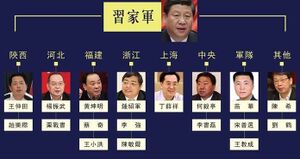جيش ژيجيانگ الجديد
جيش ژيجيانگ الجديد New Zhijiang Army 之江新军 | |
|---|---|
 | |
| Leader | شي جنپنگ |
| تأسس | 2002 |
| المقر الرئيسي | Beijing & Hangzhou |
| الصحيفة | Sing Pao Daily News in Hong Kong |
| الأيديولوجية | Chinese communism Socialism with Chinese characteristics Xi Jinping Thought الحلم الصيني Belt and Road Initiative الصين 2025 Populism Souverainism Chinese nationalism Neo-nationalism |
| جيش ژيجيانگ الجديد | |||
| العربية | جيش ژيجيانگ الجديد | ||
|---|---|---|---|
| الرومنة | New Zhijiang Army | ||
| |||
جيش ژيجيانگ الجديد (simplified Chinese: 之江新军; traditional Chinese: 之江新軍; pinyin: Zhījiāng Xīnjūn ؛ إنگليزية: New Zhijiang Army) is a term used by observers to represent political figures in the Communist Party of China who held important provincial and local posts during Xi Jinping's term as Communist Party Secretary of Zhejiang province. The "new army" refers to people who were closely associated with Xi and identifies with his political views, and who have since then taken on prominent political posts at the provincial level or in central party and state organs.
The term was first widely used by Ma Haoliang (马浩亮), editor at Hong Kong-based newspaper Ta Kung Pao in an article entitled the New Zhijiang Army of Chinese Politics. The term Zhijiang refers to the Qiantang River, which runs through the province, but is often used as a poetic reference for the greater Zhejiang region. The term was initially used as title to Xi Jinping's book Zhijiang Xinyu (之江新语), a book compiling the political philosophies of Xi Jinping during his five-year term as party chief of Zhejiang, published in 2007.[1]
The people close to Xi Jinping have also been referred to as 習家軍 Xí Jiājūn (“Xi clan”).[2][3]
الأعضاء المقترحون
| الاسم | وُلِد | المنصب في ژىجيانگ في عهد شي | المنصب الحالي |
|---|---|---|---|
| تساي چي 蔡奇 |
ديسمبر 1955 | Party Secretary of Quzhou, Party Secretary of Taizhou | Party Secretary of Beijing |
| Huang Kunming 黄坤明 |
نوفمبر 1956 | Mayor of Huzhou Party Secretary of Jiaxing |
Head of the Propaganda Department of the Communist Party of China |
| Chen Derong 陈德荣 |
March 1961 | Mayor of Jiaxing | Chief executive of China Baowu Steel Group |
| Bayanqolu 巴音朝鲁 |
October 1955 | Party Secretary of Ningbo | Party Secretary of Jilin province |
| Lou Yangsheng 楼阳生 |
October 1959 | Party Secretary of Lishui | Party Secretary of Shanxi province |
| Xia Baolong 夏宝龙 |
December 1952 | Deputy Party Secretary of Zhejiang | Vice chairman of the Chinese People's Political Consultative Conference |
| Li Qiang 李强 |
July 1959 | Secretary-General of Zhejiang Party Committee | Party Secretary of Shanghai |
| Chen Min'er 陈敏尔 |
September 1960 | Director of Zhejiang provincial party Propaganda Department | Party Secretary of Chongqing |
| Ying Yong 应勇 |
November 1957 | Director of Supervision Department, Zhejiang President of Zhejiang High Court Deputy Secretary of Zhejiang Discipline Inspection Commission |
Communist Party Secretary of Hubei |
| Zhong Shaojun 钟绍军 |
1968 | Xi's chief of staff | Senior Colonel of the People's Liberation Army Deputy Director of the General Office of the Central Military Commission |
| Li Xi 李希 |
1956 | أمين الحزب الشيوعي في Guangdong | |
| تشن شي 陳希 |
September 1953 | Head of the Organization Department of the Communist Party of China | |
| He Lifeng 何立峰 |
February 1955 | Chairman of the National Development and Reform Commission | |
| Shu Guozeng 舒國增 |
1956 |
غيرهم
Other politicians have been named by Chinese-language media as associates of Xi Jinping. They have known or worked under him as a result of their regional tenures in Shaanxi province (Xi's "home province"), the southeast (Zhejiang and Fujian provinces), or through Tsinghua University, where Xi spent time in his youth. Those named include Li Zhanshu, Liu He, Chen Xi, He Yiting, Wang Xiaohong, Li Shulei, and Huang Xingguo (since disgraced). In the military, Liu Yuan, Zhang Youxia, and Liu Yazhou have been named as some of Xi's top associates.[4]
انظر أيضاً
المراجع
- ^ Ma, Haoliang (December 29, 2014). "中国政坛的"之江新军"". Ta Kung Po via Mingjing. Archived from the original on 12 January 2015. Retrieved 12 January 2015.
- ^ ""習近平智囊走出幕後'習家軍'全面亮相 Xi Jinping zhinang zouchu muhou 'Xi Jiajun' quanmian liangxiang (The brain trust of Xi Jinping. Going behind the scenes. The 'Xi clan' fully revealed)"". 新唐人電視臺 Xintangren dianshitai. Retrieved 2017-09-22.
- ^ 楊 Yang, 光 Guang. ""習近平的山頭主義用人路線 Xi Jinping de shantou zhuyi yongren luxian (The cliquish cadre promotion line of Xi Jinping)"". Retrieved 2017-09-22.
- ^ Reuters via Deutsche Welle
- Articles containing explicitly cited عربية-language text
- Articles containing simplified Chinese-language text
- Articles containing traditional Chinese-language text
- Articles containing إنگليزية-language text
- Pages using Lang-xx templates
- Articles containing صينية-language text
- Factions of the Communist Party of China
- ژىجيانگ





